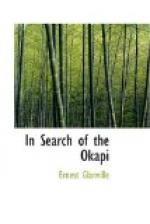All the time, they had their eyes turned up on the watch for the slightest movement, but the tree was as quiet as if it had not harboured anything more dangerous than a caterpillar.
“Where’s Muata and the other boy, sir?”
“Gone after a red bush-pig. I think I hear them breaking back.”
They heard the hunting cry of the jackal, then a sound of crashing, and an animal, brick-red—a strange hue for the sombre shadows of the forest—darted into view, and seeing them, halted with snout lowered, and the bristling neck curving up grandly to the high shoulders. A moment it stood there facing them, defiant, its little eyes gleaming, its tusks showing white, and the foam dripping from its jaws. A moment, and then it sank to the ground, and was hidden under a writhing mound of coils. Swift as an arrow the python had swooped at the prey, fastened on the neck with its jaws, and then overwhelmed it by the avalanche of its enormous length. There followed a sickening crunch of bones, and next a wild cry from the jackal, repeated by Muata and the river-man.
Mr. Hume advanced with his Express ready, but Muata, running round, begged him not to fire.
“It is the father of the wood-spirits. He took the red pig instead of one of us.”
“Not for the want of trying,” said Venning. “He nearly had us both, Muata.”
“But he took the pig,” said Muata. “It is his hunt, and it means well for us that he took the pig.”
“It certainly does; but how are we to get our guns, if we don’t shoot him?”
Muata placed his weapon on the ground and advanced. The python had completed its work so far. Two vast coils were round the crushed body of the boar; the head rested on the upmost coil, with the eyes fixed on the intruders, and the rest of the body reached away into the shadows.
Muata advanced with the palms of his hands open, and his eyes downcast, as if he were in the presence of some great chief. Yet he showed no fear, never faltered, but walked up to the guns, picked them up within a foot of the spot where the length of the serpent had formed a loop, and returned. The lidless eyes watched, but not a coil moved.
“It is well,” said Muata, gravely, as he returned the rifles. “He means well by us.”
“You would not have said that if you had been up the tree with us, and with him,” grumbled Compton.
“The tree is taboo. I said it.”
“Do you mean that he lives here? I should think he would starve.”
“That would be your word, young great one. But, see, look at my father there. He is big, very big, very heavy, very old. He does not care to move far. Yet he is wise. So he has chosen his hunt; and he has chosen well.”
“I cannot see it. The little people give him a wide berth, and a pig might come along once a year.”
“Such is your wisdom, little great one. But, see, in the trees above there is a roadway, and on the ground below there are other paths for the things of the forest who neither fly nor climb. These trees lie in the way of such a road. On the ground, if you had looked you would have seen the spoor of the red pig and other things of the forest.”




